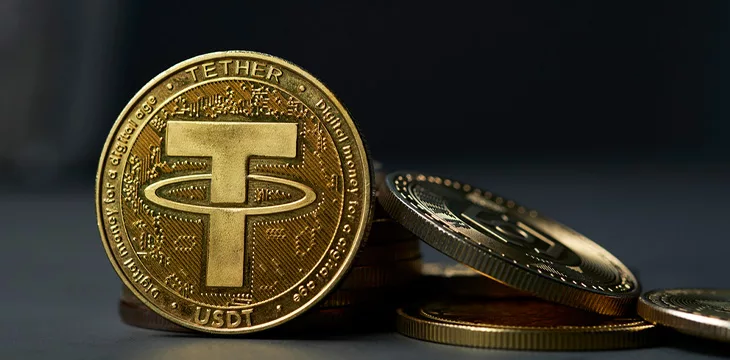|
Getting your Trinity Audio player ready...
|
Circle, the issuer of the USDC stablecoin, has urged U.S. authorities to crack down on its controversial rival Tether (USDT) by targeting the latter’s asset custodian, Wall Street giant Cantor Fitzgerald (NASDAQ: ZCFITX).
On February 15, the U.S. House of Representatives’ Financial Services Committee (FSC) held a hearing titled Crypto Crime in Context Part II: Examining Approaches to Combat Illicit Activity, a follow-up to the original hearing last November. Among the witnesses invited to testify was Caroline Hill, Circle’s senior director of global policy and regulatory strategy.
In her written testimony, Hill said, “some digital asset companies have a public track record of proclaiming themselves above AML/CFT [anti-money laundering/combating the financing of terrorism] regulation, even if issuing a USD-backed token, which has served as a ‘Welcome Sign’ for terrorists, fentanyl manufacturers, terrorist organizations, and state-sponsored actors.”
Hill said, “it is critical that stablecoin issuers are licensed, regulated, and operate with coordinated supervision by governmental authorities … [n]ot all operators in this market, including opaque so-called stablecoin issuers, abide by these standards, which produce a dangerous regulatory and financial crime compliance arbitrage.”
Hill warned that ‘offshore’ entities pose a “challenge to [U.S.] dollar dominance” and referenced the Treasury Department deputy secretary’s late-2023 warning that the U.S. “cannot allow dollar-backed stablecoin providers outside the United States to have the privilege of using our currency without the responsibility of putting in place procedures to prevent terrorists from abusing their platform.”
Hill followed up on this by suggesting that the Treasury “should have the proper authority to capture” illicit stablecoin activity, adding that “U.S. touchpoints—in the traditional financial sector or via a [virtual asset service provider]—should be held responsible for promulgating or otherwise facilitating the existence of these non-compliant tokens.”
To illustrate her point, Hill cited the Terra/Luna fiasco as an example of a ‘so-called stablecoin’ that deserved smacking down before it imploded on its own. But most observers interpreted her comments as thinly veiled shots across the bow of Tether and also of Cantor Fitzgerald, whose CEO Howard Lutnick has recently revealed his company serving as the custodian of Tether’s alleged stash of over $63 billion in U.S. Treasuries.
Shots fired
Hill echoed these sentiments during her committee appearance, again without referencing Tether or Cantor by name. Rep. Bryan Steil (R-WI) picked up on her points during a series of questions about crypto’s role in ransomware and other scams. Steil cited “touchpoints involving dollars as a key point in being able to claw back stolen funds.”
Hill responded that U.S. authorities “should also ensure that offshore actors that are either using the dollar as a reference point or using the U.S. financial system or U.S. touch points are captured by U.S. AML/CFT standards. They should not be allowed to have no [Bank Secrecy Act] program, no AML program, if they’re leveraging the U.S. dollar or the U.S. financial system.”
Grant Rabenn, director of financial crimes legal at the Coinbase (NASDAQ: COIN) digital asset exchange, called Hill’s version of events “100% correct. That’s where the financial risks are currently located in relation to crypto money laundering and illicit finance.”
Rep. Wiley Nickel (D-NC) then went for the jugular, calling out Tether by name as one of the “best examples of bad actors” operating in the digital asset space and asking Hill how U.S. enforcement agencies could best disrupt their activities.
In response, Hill said the government should “ensure it’s using its authority when there are those U.S. touchpoints.” Wiley then mentioned Cantor Fitzgerald’s reported role serving as Tether’s T-bill custodian and “giving [Tether] access to U.S. dollars.” Wiley followed by saying, “Cantor’s enabling of terrorist and other illicit activity across the globe is unacceptable.”
Wiley asked whether the Treasury currently had the authority to take action on this front and pressed Hill on “what should we be doing about American-regulated companies like Cantor?” Hill said she believed Treasury had the necessary authority to act “and I hope they’re looking at this seriously given Tether’s reputation.”
The day after this remarkable exchange, Tether CEO Paolo Ardoino offered this testy rebuttal: “Misleading Congress is a shocking act of desperation and those who do should be ashamed of themselves. Spouting lies and running in Circles never gets you anywhere.”
Smelling blood in the water
As Congress was taking advice from Circle and Coinbase, JPMorgan (NASDAQ: JPM) analysts issued a report suggesting U.S. regulators could “exert some control on Tether’s offshore usage via OFAC [Treasury’s Office of Foreign Assets Control]. Tether’s association with Tornado Cash, a privacy enhancement platform on the Ethereum network, is an example.”
This is the second time this month that JPMorgan has thrown shade at Tether, having previously labeled its dominance of the U.S. dollar-denominated stablecoin market due to its “lack of regulatory compliance and transparency.”
In a touchy response to The Block, Tether CEO Ardoino claimed, “JPMorgan’s current concerns seem more related to the jealousy towards the evolution of financial and payment services, which they have been ignoring for a decade, and now they’re upset because it got a lot of traction. If I were them, I would be more concerned about their $39 billion total fines.”
When Howard met Bukele
Tether and its sister company, Bitfinex, began developing close ties to El Salvador not long after President Nayib’ cool dictator’ Bukele was elected in 2019. Both companies launched a charm offensive with BTC fan Bukele, and the relationship intensified in 2022 when Bukele approved stablecoin-friendly legislation. This represented a sufficiently large victory to coax Tether co-founder Giancarlo Devasini out of whatever subterranean hideout he traditionally calls home.
More recently, Cantor CEO Lutnick made his own pilgrimage to Bukele’s compound to be photographed alongside El Presidente, Ardoino, Devasini, and BTC shill Max Keiser. Whatever Lutnick’s motivation—Cantor has so far declined to join rivals Blackrock and Fidelity in offering its own BTC exchange-traded fund—his timing couldn’t have been worse.
Given the generally antagonistic relations between Bukele and the U.S. federal government, Lutnick’s trip could prove a tipping point for federal politicians and/or authorities who might feel squeamish about seizing assets custodied by a U.S. financial heavyweight.
Stablecoin legislation momentum
FSC chairman Rep. Patrick McHenry (R-NC) is retiring at the end of the current term, but he’s vowed to pass his Clarity for Payment Stablecoins Act of 2023 before he leaves. There appears to be gathering momentum behind getting this done.
Last week, Politico reported that Jerome Powell, chairman of the U.S. Federal Reserve, told Democratic members of the committee that “we need a framework for stablecoins.” Referencing previous reports that McHenry and the committee’s ranking member Maxine Waters (D-CA) had an ‘understanding’ about moving the Clarity Act forward, Powell added that he was “very supportive and am glad that we are close.”
The Act was always viewed as a favor to campaign-donating U.S. companies like Circle and its exchange partner Coinbase. But the growing calls for an enforcement component against non-compliant rivals could give this Act some badly needed teeth—and should give Tether pause about what’s coming next.
Follow CoinGeek’s Crypto Crime Cartel series, which delves into the stream of groups—a from BitMEX to Binance, Bitcoin.com, Blockstream, ShapeShift, Coinbase, Ripple,
Ethereum, FTX and Tether—who have co-opted the digital asset revolution and turned the industry into a minefield for naïve (and even experienced) players in the market.

 02-16-2026
02-16-2026 




